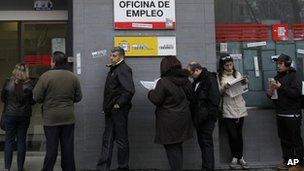Spain's population shrinks as immigrants flee economic crisis
- Published

Spain's population fell last year for the first time in decades, as immigrants left the country amid a major economic crisis, officials say.
The National Statistic Institute (NSI) says the number of residents dropped by almost 206,000 to 47.1m - the decline entirely accounted for by foreigners.
Immigrants from Ecuador and Colombia showed the biggest fall.
The figures do not take into account many Spaniards who have left in search of work but are still on the census.
'Less attractive'
The statistics agency recorded Spain's first population drop since the regular census began in the 1990s.
Although the number of native Spaniards grew in 2012 by some 10,000 - it only minimally offset the overall fall of nearly 216,000 among registered foreign residents.
The figures show that the ongoing economic crisis has reversed the country's rapid population growth in the decade before the financial crisis erupted in 2008.
The bursting of the property bubble and high unemployment levels compounded the situation, forcing many economic migrants from South America and Eastern Europe to leave the country.
"Spain is less attractive because there are no jobs," Albert Esteve of the Barcelona Centre for Demographic Studies told Spain's National Radio.
- Published30 January 2013
- Published10 February 2012